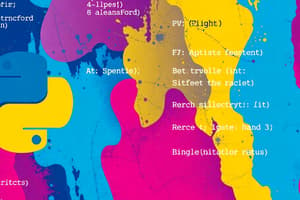Podcast
Questions and Answers
What role does the base case play in a recursive function?
What role does the base case play in a recursive function?
- It allows the function to call itself continuously.
- It initializes the values used in the function.
- It represents the final result of the function's execution.
- It specifies the condition under which the recursion stops. (correct)
What would happen if a recursive function lacks a proper base case?
What would happen if a recursive function lacks a proper base case?
- It will return an error immediately.
- It will always complete its task successfully.
- It may lead to an infinite loop. (correct)
- It will run faster than expected.
In the given countdown function, what does the line 'countdown(counter - 1);' accomplish?
In the given countdown function, what does the line 'countdown(counter - 1);' accomplish?
- It halts the function until the countdown completes.
- It restarts the countdown from the original counter value.
- It returns the current value of the counter.
- It recursively calls the function with a decremented value of counter. (correct)
What is a potential disadvantage of using recursive functions?
What is a potential disadvantage of using recursive functions?
Which of the following correctly describes the output of 'countdown(3)'?
Which of the following correctly describes the output of 'countdown(3)'?
Flashcards
Recursive Function
Recursive Function
A function that calls itself to perform repetitive tasks.
Base Case
Base Case
A condition that stops the recursion (prevents infinite loops).
Recursive Call
Recursive Call
When a function calls itself within its own code.
Infinite Loop (Recursion)
Infinite Loop (Recursion)
Signup and view all the flashcards
Stopping Condition
Stopping Condition
Signup and view all the flashcards
Study Notes
Recursive Functions
- Recursive functions call themselves to repeat actions.
- Useful alternative to loops for repetitive tasks.
Creating a Recursive Function
- Define a function.
- Include a base case: A condition to stop the recursion.
- Example: A function to log numbers in descending order.
Avoiding Infinite Loops
- Crucial to have a clear stopping condition.
- Use a variable (like a counter) and a conditional return statement to control when the function stops calling itself.
Example Code (countdown function)
function countdown(counter)takes an initial value.- Logs the current value of
counter. if (counter === 0): Base case - stops recursion.return;: Exits the function.countdown(counter - 1): Recursive call; decrements the counter and calls the function again.
Example Usage
countdown(3)will produce the output:- 3
- 2
- 1
- 0
Studying That Suits You
Use AI to generate personalized quizzes and flashcards to suit your learning preferences.




